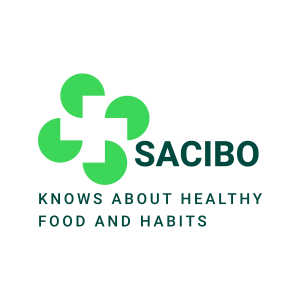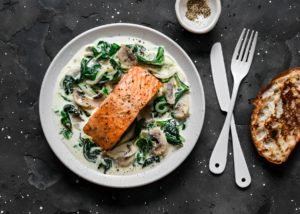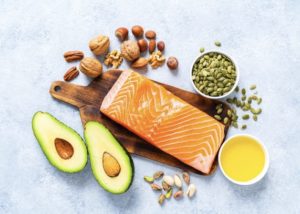- Home
- /
- Healthy Meal
- /
- Diets
- /
- In general about diets
- /
- Decoding Diets: A Short...
Diets are a crucial aspect of maintaining a healthy lifestyle. A diet refers to the types of foods and drinks consumed regularly. There are numerous types of diets available, and each has a different focus and goal. Some diets aim to help individuals lose weight, while others focus on improving overall health or managing specific health conditions.
The Mediterranean diet
One of the most popular types of diets is the Mediterranean diet. This diet is based on the traditional eating patterns of countries bordering the Mediterranean Sea, and it emphasizes the consumption of fruits, vegetables, whole grains, lean protein sources, and healthy fats such as olive oil. Studies have shown that the Mediterranean diet may help reduce the risk of heart disease, stroke, and certain types of cancer.
The Ketogenic diet
The ketogenic diet is another popular diet that has gained popularity in recent years. The ketogenic diet is a high-fat, low-carbohydrate diet that aims to put the body into a state of ketosis. So the body burns fat for energy instead of carbohydrates. The diet has been shown to be effective in promoting weight loss, managing type 2 diabetes, and reducing the risk of certain neurological conditions such as epilepsy. But the ketogenic diet can be dangerous for individuals with certain health conditions, such as those with liver or kidney disease and also may lead to disordered eating habits, nutritional deficiencies and changes in the microbiome.
The Vegetarian and Vegan diet
Vegetarian and vegan diets are also becoming increasingly popular. Vegetarian diets exclude meat and fish, while vegan diets exclude all animal products, including dairy and eggs. These diets are often chosen for ethical or environmental reasons, but they also offer health benefits such as reduced risk of heart disease, stroke, and certain types of cancer. At the same time, it is important to consult with a healthcare professional before embarking on a vegetarian or vegan diet to ensure that it is nutritionally balanced and suitable for your individual needs.
The Paleo diet
Other popular diets include the paleo diet, which emphasizes the consumption of foods that were available to our ancestors during the Paleolithic era. Also the paleo diet is the gluten-free diet, which excludes all foods that contain gluten, a protein found in wheat, barley, and rye. While these diets have their benefits, it is important to note that they may not be suitable for everyone and should be approached with caution.
The DASH diet
The DASH diet is a dietary pattern designed to help manage hypertension. The main idea is in the consumption of whole, nutrient-dense foods and limit processed and high-sugar items. While the DASH diet has gained popularity over the years, there is still inconsistency in the field of nutrition and diet about the best approach to managing hypertension and overall health. Some studies have suggested that a low-carbohydrate, high-fat diet may be equally effective or even more effective for managing blood pressure levels and reducing the risk of cardiovascular disease. Other studies have found that plant-based diets may offer similar benefits to the DASH diet
The MIND diet
The MIND diet is a relatively new approach to nutrition that focuses on the brain-healthy properties of certain foods. It combines elements of the Mediterranean diet and the DASH diet (Dietary Approaches to Stop Hypertension) and emphasizes foods such as green leafy vegetables, berries, nuts, whole grains, fish, and poultry. Studies suggest that following the MIND diet may help lower the risk of developing Alzheimer’s disease and other forms of cognitive decline. The diet’s focus on plant-based foods and avoidance of processed and unhealthy foods aligns with many established principles of a healthy diet. However, more research is needed to fully understand the potential benefits of the MIND diet and how it may be incorporated into a healthy lifestyle.
The diversity of diets
The diversity of diets available means that individuals can choose a diet that suits their lifestyle and preferences. Some individuals may find success with a low-carbohydrate or high-protein diet. Others may prefer a plant-based diet. It is important to note that there is no one-size-fits-all approach to diet, and what works for one person may not work for another.
Diets play a crucial role in maintaining a healthy lifestyle. The diversity of diets available means that individuals can choose a diet that suits their lifestyle and preferences. Popular diets such as the Mediterranean diet, ketogenic diet, vegetarian and vegan diets, Dash, Mind diets, etc. offer numerous health benefits, but it is important to approach them with caution and consult with a healthcare provider before starting any diet.
Why can diets be dangerous?
Why can diets be dangerous? Diets can be beneficial in promoting weight loss and improving overall health. However it is important to approach them with caution. Fad diets, which promise quick and easy weight loss, may be harmful and unsustainable in the long term. It is important to consult with a healthcare provider before starting any diet. It can help ensure that it is safe and appropriate for individual needs and health conditions.
A potential danger of diets is when individuals choose to follow them without consulting with a healthcare provider. Many popular diets may not be appropriate or safe for everyone, and it is important to consider an individual’s overall health and medical history before embarking on a new diet plan.
For example, individuals with certain medical conditions, such as diabetes or heart disease, may need to follow a specific diet that is tailored to their condition. Following a diet that is not appropriate for their medical needs can lead to serious health complications.
In addition, following a restrictive diet without proper guidance can lead to nutritional deficiencies and other health concerns. For example, a diet that eliminates entire food groups, such as carbohydrates or fats, may not provide the body with all of the necessary nutrients for optimal health.
Why can you need nutrition specialist?
Not only diseases can cause the recommendation of some diets. We are all different. So nutrition specialist can suggest you diet individually for you including your state at the moment, your genetic factors, individual intolerance, stress level, lifestyle etc.
It is important to approach diets with caution and to seek guidance from a specialist before starting any new diet plan. A nutrition specialist can assess an individual’s overall health and medical history and provide recommendations for a safe and appropriate diet plan.
In summary, choosing to follow a diet without consulting with a specialist can be dangerous and lead to serious health complications. It is important to consider an individual’s overall health and medical needs before embarking on a new diet plan, and to seek guidance from a specialist to ensure safe and proper implementation.
































































0 Comments